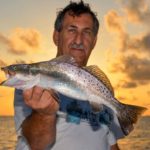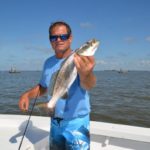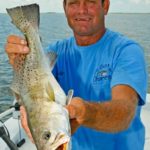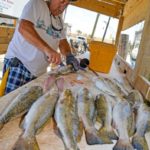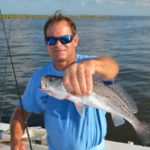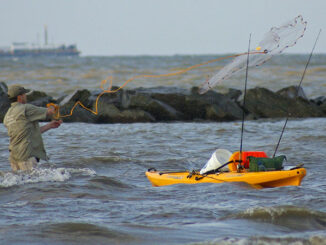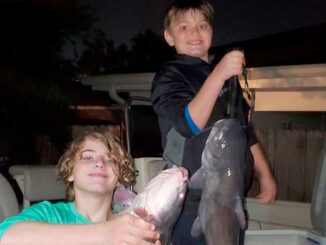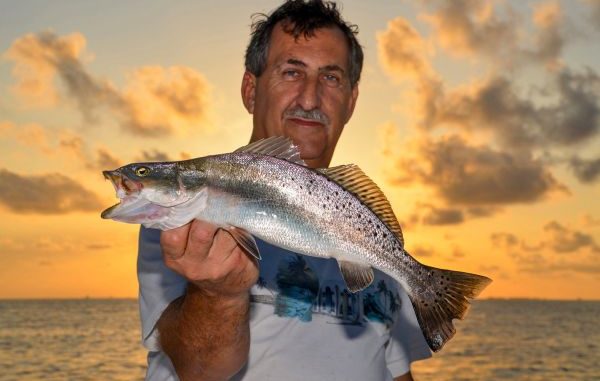
Secret spots aren’t needed to put the hurting on the trout out of Grand Isle. All you have to do is beat the crowds to one of the community holes. Here are some tips to maximize your efforts.
It was a sight to see in the dim light of dawn. There were untold thousands of birds.
Wide-bodied pelicans occupied every rock fringing the island. Many more of the big birds’ white-crowned heads stuck up out of the island’s grass.
The center of the island was frosted with snow-white egrets. Overhead, a careening horde of laughing gulls flew patrol over all below them.
Queen Bess Island was within easy sight of Grand Isle — not exactly a secret spot.
I was in the company of two of the island’s most-notorious trout whackers. Capt. Jody Auenson (Go Get ’Em Charters, 985-637-9891) gets them with a hook. Ricky Richoux, alias “The Slimeslinger,” (504-415-0093) zaps them with a knife and is the island’s professional fish cleaner.
With this pair of pros, I was expecting that some faraway, unmarked secret spot would be our destination, but here we were.
“All the people now call it Bird Island,” Auenson said with a shrug. “Only the old people call it Queen Bess. I say Bird Island was where Bird Reef is now. ‘Well,’ they say, ‘this one’s got birds all over it.’
“It’s a popular fishing place that everybody knows about.”
But that doesn’t mean you can just pull up anywhere and catch fish. There are sweet spots, which change according to the tide.
“Always fish on the upcurrent side of the island — on the north side on an outgoing tide and the south side on an incoming tide,” Auenson said.
The tide on this morning was rising, so we stopped to fish the island’s south side.
All in all, the guide has a strong preference for fishing on incoming tides.
“They bring cleaner water,” Auenson explained. “You need clean water to fish with croakers. I fish croakers because I like the bite.
“I like the feeling, the way they hit it — the thump. I like them because they catch bigger fish.”
The spot was indeed popular. It was a weekday, and the sun wasn’t even up yet. Still, three boats were fishing on one side of Auenson’s boat and two on the other.
“What?” he yelled to the boat next to him that held a friend. “Nobody works no more?”
The pair tossed casts toward the shallows near the island. Speckled trout immediately jumped on their Texas-rigged croakers.
First Richoux’s rod and then Auenson’s bowed deeply. The first two fish were in the boat before the sun even peeped over the horizon.
With the next two specks on, Auenson began fretting over porpoise problems. Two days earlier, in this same spot, he went through a new box of 50 kahle hooks, losing all of them to the marauding mammals.
“We caught 14 fish with no problems,” he said. “Then they started. We never landed another fish.
“I left five times and came back. They never left.”
The action was fast, but the porpoises were here.
Auenson began coaching Richoux when a porpoise grabbed his hooked trout.
“Free-spool it! Free-spool it!” Auenson coached. “When the porpoise doesn’t feel any resistance, sometimes he loses interest and drops it.”
Sure enough, it worked.
When the porpoise dropped the trout Richoux was able to land it. The speck was completely scaled and looked terrible. But it was a fish in the box.
Another anti-porpoise tactic is to reel fast, the guide explained.
“You can’t out-race them once they see the fish, but you can sometimes get the fish in before they see it,” Auenson said.
That worked for Richoux, too. After losing a fish to the porpoises, he reeled the next one in furiously, almost bouncing it on the surface.
It was quite a chore. The trout were nice — most all of them over a pound — but easing up the least little bit to enjoy the fight invariably ended with a porpoise grabbing the hooked fish.
“The porpoise problem started five or six years ago,” Auenson said. “At first it was every now and then. Now it’s regular, especially at Queen Bess and Hotel Sid (a Barataria Bay oil platform).”
But the good bite had Richoux cheerful. Most of the time he doesn’t get to do the catching because he’s on the other end of the equation — the cleaning.
“These are transformers,” he quipped as he netted a croaker. “When I hook them on, they are croakers; when I reel them in, they are speckled trout.”
The bite was good, and the pair was suddenly keeping all of their trout out of the toothy jaws of the porpoises.
“You know who is not here,” Auenson smirked, while throwing a furtive glance toward the water. “I don’t want to jinx us by saying their name.:
For some reason the porpoises had left.
The action was hot and the specks averaged 1 to 1 ¾ pounds, good for speckled trout anywhere.
Auenson showed unbelievable touch in detecting bites, but Richoux was holding his own enough for Auenson to notice.
He took a grinning dig at Richoux.
“You know even a blind hog can find an acorn once in a while,” Auenson joked.
The master fish cutter chuckled softly and pretended to ignore him.
At 8:10 a.m., Auenson laid down his rod to count fish.
“We got 41,” he declared. “Even though these are good fish for Grand Isle, let’s go get some bigger fish.”
It was hard to believe that Auenson was pulling off this bite.
All the other boats but one had left before Auenson. He pulled close enough to them to direct them to the bite he was leaving, and then he turned and headed east.
His stop, Independence Reef, was marked by a solitary pelican-poop-painted piling.
Less than 10 minutes after casting, he lamented his move.
“I don’t feel my croaker getting nervous,” Auenson said. “I can tell right away if there are trout there. The croaker twitches and jerks. They don’t do that for catfish and other fish.
“I could save a lot of money on bait if people (aka customers) would let me cast first. But you know: People pay to fish, and they want to cast.”
Despite the current evidence, Auenson said Independence Reef is a proven producer.
“This is a good spot to fish in the afternoon on a falling tide,” he muttered as he reeled in. “With live shrimp you can load the boat, but they are small.
“It’s the best-known spot in Grand Isle.”
As Auenson neared his next stop — the old sulfur mine in Lake Washington — Richoux clapped his hands in glee.
“My favorite spot,” he crowed.
Auenson killed the boat’s big motor and trolled it into the footprint of the old mine.
It was a bewildering maze of operating oil-field structures and abandoned sulfur mine junk. The area was littered with pilings, piling stubs, and submerged concrete and metal debris.
“Don’t drag your bait here or you will hang up,” Auenson counseled. “When you have to move it, jig it a couple of times instead of dragging it.”
In spite of Richoux’s enthusiasm, the stop didn’t produce a fish for the men.
Auenson jogged the boat a short distance south to a spot he called, “the little island with the flare.” That was pretty descriptive — except the flare wasn’t on an island anymore.
Actually, there wasn’t even enough left to dignify with the name “island,” either: just a table-top patch of grass.
The best marker for the spot, an adjacent tank battery compressor complex had been wiped out by Hurricane Katrina, to be replaced with a compressor on a barge.
The men had to wait a bit before Richoux caught the first fish, the only peewee of the morning — an 11 ½-incher.
Finally the fish began coming slowly until they hung up two fish short of their limit.
A stop back at Queen Bess Island took care of that with a pair of 2-pounders.
Back at the marina, while Richoux was demonstrating his skills as a fish cleaner, I asked him how he got the nickname “Slimeslinger.”
“I was working at a table that faced away from the water,” he said with a mischievous grin. “While I was cleaning the fish, the knife slipped through a fish, and slime and guts hit a woman nearby. She looked down at the mess and said, ‘You slung slime on me.’ I apologized, but did mention that it was a fish cleaning station, after all.
“One of my buddies standing there said, ‘Slimeslinger; that would be a good name for you.’”
